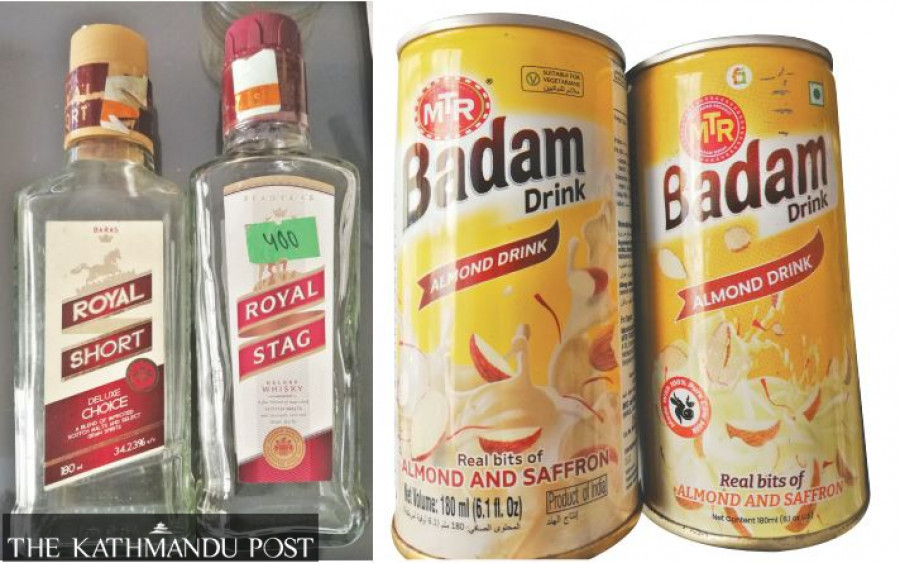Money
Trademark bill languishes as infringement cases rise
Four years ago, the government prepared a draft bill to introduce a law on trademark, copyright and intellectual property rights. It is gathering dust.
Krishana Prasain
The cases of trademark infringement have been on the rise each passing year due to the failure of the government to enact a new law in line with the fast-changing nature of world trade and services.
Four years ago, the government prepared a draft bill to introduce a law on trademark, copyright and intellectual property rights.
The new law would supersede an age-old Patent, Design and Trade Mark Act 1965.
The government officials, however, said the bill has reached nowhere due to the frequent change in governments.
Bimal Baral, undersecretary of the Ministry of Industry, Commerce and Supplies, said that the draft bill was sent to the Law Ministry for its approval a year ago. “It was then returned after the change in the government.”
The process has been started again, he said.
The bill will make another round of the Law and Finance ministries to get their inputs before it is tabled in the Cabinet. After the Cabinet’s approval, the draft bill will be registered in Parliament.
The officials at the Industry Ministry said they are clueless because the government has changed, once again.
“The new government needs to take ownership of the bill. The frequent change in governments freezes the process of formulation and passage of the bill,” said one of the officials.
Janak Bhandari, an advocate at Global Law Associates, said the delayed law enforcement provides a leeway to opportunistic traders.
The draft bill was prepared in 2019.
Cases of trademark infringement are increasing in the country, mainly for two reasons—weak law and weak enforcement of the law, said lawyers.
Unscrupulous manufacturers are producing counterfeit goods, finding the weak areas in the laws which are old and have not been revised or amended since 1965.
Bhandari, who looks after trademarks, patent, industrial design and copyright cases, said the trademark infringement cases have risen by 30 percent annually, mainly due to the weak law.
The trademark infringement is rising especially in soft drinks and other beverage products, he added.
According to Bhandari, there are strong clauses in the proposed bill to control rising trademark infringement.
“We have proposed a provision not to provide bail for six months or a year for the person involved in trade infringement. The fine amount of Rs500,000 to Rs1 million has been proposed for the wrongdoers,” he said.
Currently, the director general of the Department of Industry has been handling trademark infringement-related cases. “The proposed draft bill has proposed a separate board to look after such cases,” Bhandari added.
In Nepal, the lack of stringent laws has been affecting foreign direct investments (FDI).
The government officials, too, admit that the FDI has been on a declining trend due to a lack of strong laws on trademark, copyright and intellectual property.
Foreign investors have been complaining about the rising trade infringements and this is preventing newcomers from coming to Nepal.
Foreign investors are very particular about intellectual property rights, but the government does not seem to be serious about it, industry insiders say.
The foreign direct investment declined by 40 percent by mid-February, which marked the end of the first seven months of the current fiscal year.
According to the Department of Customs, Nepal received a foreign direct investment commitment of Rs18.65 billion in the first seven months of the current fiscal year as compared to Rs31.10 billion in the same period last fiscal year.
“The rising trademark infringement discourages the foreign direct investors to invest and slow action in such cases also keeps them away,” said Siddhant Raj Pandey, chairman and CEO of Business Oxygen, Nepal’s first private equity fund.
For instance, according to Pandey, it took years for Nepal’s apex court to issue a verdict on the trademark rights battle of Kansai Nerolac Paints Nepal, a subsidiary of Kansai Paints Company, Japan.
In 2020, Kansai Nerolac Paints Nepal won a six-year-long trademark rights battle against Rukmini Chemical Industries.
In a recent case, the Kathmandu Metropolitan Crime Division arrested three people from Tikathali, Lalitpur for producing counterfeit alcohols in the name of different national and international brands like Golden Oak, Khukri Rum, Red Label and Jack Daniel.
“There are many such cases pending in the courts,” said Pandey.
The foreign investors look for security of their investments, Pandey said. “The investment comes when the laws are strong, including other business environment factors.”
Pandey said it has already been too late for a country like Nepal to introduce the new law as per the changing landscape.
Nepal’s intellectual property rights law is around 28 years old.
“The world is moving towards digitization,” said Pandey.
According to the Department of Industry, the trademark-related cases during the first seven months of the current fiscal year were 62.
The cases were 64 during the same period last fiscal year.
The registration of the trademarks and patent rights, however, has been encouraging.
The department said it has registered one patent right, eight designs and 1,785 trademarks in the first seven months of the current fiscal year.
During the same period last fiscal year, 13 designs and 1,634 trademarks were registered.




 12.12°C Kathmandu
12.12°C Kathmandu














